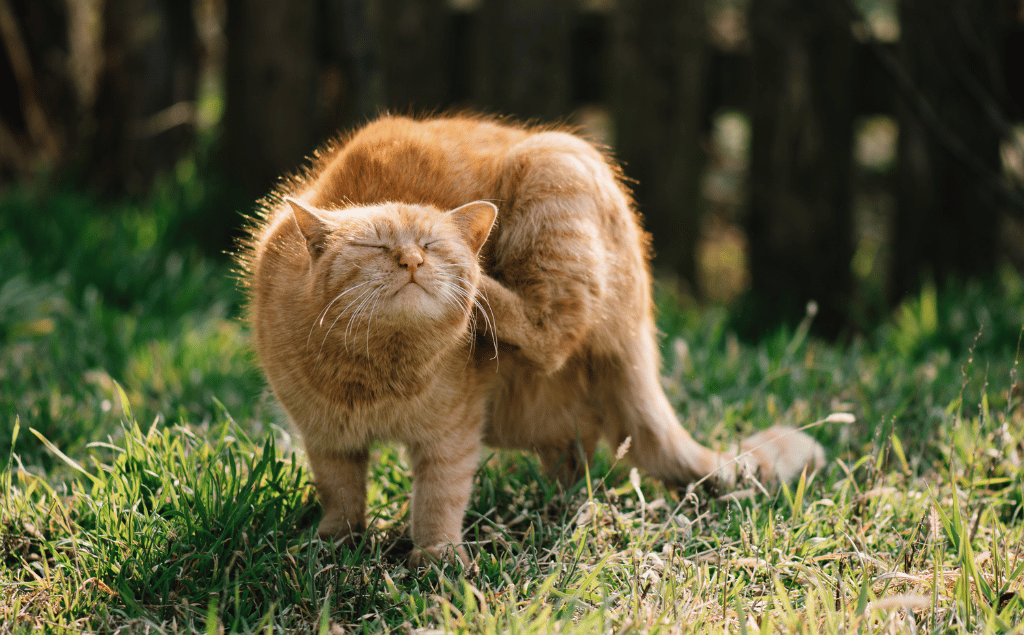
Protecting Your Cat from Outdoor Threats: Bugs, Rodents & Beyond
Cats have a natural curiosity that often leads them to explore the outdoors. However, there are hidden dangers that can threaten their health and wellbeing. From pesky parasites to harmful rodents, knowing how to keep your feline friend safe is key to avoiding potential emergencies.
This guide explores the most common outdoor threats, how to identify symptoms of problems, and, most importantly, ways to protect your cat from harm. Whether you're a seasoned cat owner or new to the world of pet care, this blog will provide you with actionable steps to keep your cat safe and healthy.
5 Common Bugs That Can Bite Cats
Certain bugs pose significant risks to cats, particularly during the active summer months in the Midwest.
While some insects are simply pests, others can transmit diseases or cause allergic reactions. Here’s a closer look:
1. Ticks
Ticks are more prominent in outdoor cats, but even indoor-only cats are vulnerable to tick bites. Ticks are carriers of many illnesses such as Tularemia, Ehrlichiosis, Bobcat Fever, and Lyme Disease.
Many of these diseases can lead to severe health complications in cats. If you find a tick on your cat, it’s essential to remove it safely and consider tick prevention options.
2. Fleas
Fleas can cause significant discomfort for cats, triggering itchiness, hair loss, and, in some cases, anemia (low red blood cell count).
Additionally, cats that ingest fleas while grooming are at risk of tapeworm infections. Monthly flea prevention treatments are a must, even for indoor cats.
3. Mosquitoes
Though tiny, mosquito bites can transmit heartworm disease to cats, which can be fatal. Since there is no direct treatment for heartworm disease in cats, prevention is critical.
4. Spiders (Black Widow, Brown Recluse, Hobo Spider)
Venomous spiders like black widows and brown recluses may bite curious cats, resulting in severe reactions and, in some instances, life-threatening symptoms.
5. Fire Ants
Fire ants are especially dangerous. These ant bites can cause severe pain, inflammation, and allergic reactions, requiring immediate veterinary care.
Pests That Are Less Dangerous, But Still Concerning
- Centipedes: Larger centipedes can bite cats, leading to localized reactions, fever, or weakness. While typically not life-threatening, close monitoring is recommended.
- Hard-bodied insects (crickets, beetles): While these insects are non-toxic, their exoskeletons can irritate a cat’s digestive system if ingested.
- Flies: Fly bites can cause pain and swelling and can lay eggs in open wounds. If these wounds are not attended to, these eggs will hatch into maggots which cause cats to become extremely ill.
Preventative Tip: Regularly inspect your cat after outdoor adventures and invest in monthly parasite-prevention treatments prescribed by your primary veterinarian.
Rodents and Cats: The Hidden Dangers
Although cats are natural hunters, allowing them to prey on rodents poses risks far beyond basic nuisance.
Ingestion of mice can cause a disease called toxoplasmosis. This is a zoonotic disease (meaning it can spread to humans). Clinical signs in cats can vary from lethargy to fever to vision problems.
If your cat is acting ill, please seek veterinary attention right away and let them know if your feline friend is a mouse hunter.
The Danger of Rat Poisons
Direct ingestion occurs when a cat eats poison directly. Many rodenticides are designed to attract rodents such as mice or rats, but inadvertently appeal to cats as well.
Secondary poisoning (“Relay Toxicosis”) happens when a cat consumes a rodent that has ingested poison. While rare, even small amounts of certain rodenticides, like bromethalin, can be deadly to cats.
Symptoms of Rodenticide Poisoning in Cats
- Neurological issues like seizures or unsteady gait
- Pale gums
- Unexplained bleeding or bruising
- Vomiting up blood
- Black stool
- Sudden lethargy or loss of appetite
- Blood in urine
- Swelling of the joints
- Muscle tremors
For prevention control methods, click here.
Keep in mind that these symptoms can differ based on the type of toxin ingested. Additionally, remember that if a small amount is consumed, signs may not be noticeable for 1-4 days after ingestion. Even if no signs are present, it’s essential to seek out emergency veterinary assistance* as soon as ingestion is suspected.
*You can also call the ASPCA Animal Poison Control Center (APCC) Hotline at (888) 426-4435. Keep in mind that a consultation fee may apply.
Symptoms of Cat Bug Bites and Poisoning
Learning to recognize symptoms early is crucial to ensuring your cat’s safety. Here's what to watch for when bugs or rodents strike:
- Bug Bites: Swelling, redness, or itching at the bite site; severe symptoms like difficulty breathing may signal an allergic reaction.
- Tick-borne Illness: Fatigue, fever, pale gums, and loss of appetite may indicate an undiagnosed tick-borne disease.
- Rodent Poisoning:One of the active ingredients in rodenticides causes kidney failure in pets. Symptoms would include lethargy, vomiting, increased thirst and urination before decreased appetite, thirst and no urination.
If you notice any of these signs, take swift action and consult an emergency vet right away.
Preventative Measures to Keep Your Cat Safe
Taking proactive steps can help you keep your cat out of harm's way. Here are a few effective strategies:
1. Invest in Monthly Parasite Prevention
Talk to your vet about flea, tick, and heartworm prevention products* that suit your cat's needs. These medications are essential for both outdoor and indoor cats.
*Use caution when applying any over the counter or online-purchased topical parasite preventives, as these products may contain unknown or harmful ingredients, especially those sourced from overseas. Many reputable manufacturers do not distribute their certified products through unauthorized retailers.
Additionally, never use a product labeled for dogs on cats, as ingredients like permethrin are highly toxic to felines and can cause twitching, tremors, or seizures. Even some products labeled “safe for cats” can cause adverse reactions.
If your cat shows any signs of twitching or tremors after application, contact a veterinarian immediately.
2. Use Pet-Safe Rodent Control Methods
Avoid traditional rodenticides and opt for solutions like Integrated Pest Management (IPM) that focus on prevention. IPM involves sealing entry points, keeping food areas clean, having a professional evaluate your home, and using non-toxic traps.
Additionally, consider using pet-safe rodent and flea control methods to keep your home rodent-free without exposing your cat to harmful toxins.
3. Indoor Alternatives to Exploring
If possible, restrict your cat's outdoor activities by offering enrichment indoors. Build window perches, invest in cat trees, or implement supervised outdoor activities with a leash harness, catio, and enclosed space.
4. Regular Grooming and Checkups
Regular grooming, whether done by you or a professional groomer, allows you to spot external parasites and bites early. Schedule regular visits with your primary veterinarian for comprehensive health checks.
When to Visit an Emergency Vet
There are moments when quick action saves lives. Immediate veterinary care is crucial for:
- Signs of rodenticide poisoning (e.g., seizures, bleeding gums)
- Severe allergic reactions from bites or stings
- Difficulty breathing
- Sudden lethargy or unresponsiveness
Need help now? Locate your nearest EVCC and get instant support from our trusted vets.
Giving Your Cat a Safe and Happy Life
Every cat owner wants their furry friend to live a long and happy life. While there are many other hazards that outdoor cats can face such as wild animal attacks or car accidents, by understanding the dangers of bugs, poison, and rodents, you can create a safer environment for your cat to explore with confidence.
Need more personalized advice or immediate assistance? Reach out to your nearest EVCC for emergency-focused medical intervention. Together, we can work together to ensure your cat stays healthy and happy for years to come.
Recent Posts
About Us
At Emergency Veterinary Care Centers (EVCC), we know that pet emergencies are unpredictable and often stressful. That's why our team, with over 20 years of emergency and critical care experience, is ready to assist you and your pet in the toughest situations.


